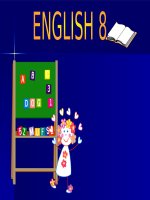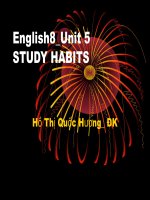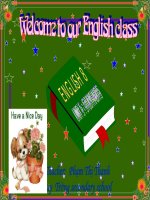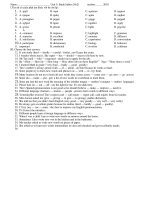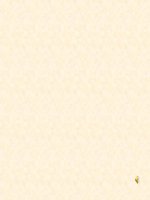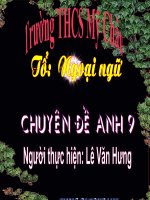Unit 5 study habit test 1
Bạn đang xem bản rút gọn của tài liệu. Xem và tải ngay bản đầy đủ của tài liệu tại đây (54.06 KB, 5 trang )
Unit
5
STUDY HABITS
TEST I
I. Fill in each blank with a subject.
Natural sciences
Physics
Social sciences
Literature
II. Which one is different from the others
in each row?
1.
excellent
good
perfect
bad
2.
literature
gymnastics
physics
algebra
3.
teacher
principal
student
worker
4.
grammar
pronunciation vocabulary
speak
5.
homework ruler
dictionary
eraser
III. Choose the most suitable word or phrase
underlined.
1.
Students think the school can / ought /
should open the library on
Saturday to give them more time reading books.
Your parents said that you should go /
went / going home right after
the school.
2. Manh needs to learn his lessons care /
carefully / careful to take his
exams well.
3. I'm sure that your teacher asked your mother
to give / gives / giving
you these books.
4. Hong 's friends told her participate / to
participate / participating in
class activities.
2.
Do you think I should to lend / lend / lent him
the newspaper?
6. Long 's friends think that he should behave
well / good / badly to his
classmates.
5.
Tuan told himself to apologize to his teacher
faithfully / faithv / faith
for his bad words to his teacher this morning.
7.
IV. Reorder the following sentences to create a
conversation.
Hoa:
I'm glad you do. I lost mine. What's the
schedule for this week0 Thanh: Me, too. Maybe
we could study together for the exam.
Thanh: Yes, I do.
Hoa: The lecture today and the film on
Wednesday aren't a problem, but I
really need to work hard to prepare
for the exam on Friday.
Hoa:
What a good idea!
Hoa:
Do you have the schedule for history
class?
Thanh: Today, there's a lecture, then on
Wednesday we see a film, and on
Friday there's an exam.
V. Hoa felt sad for her results in the exam and
found her teacher, Ms Mai, to ask her for some
advice.
Here is their conversation. However, some of
Ms Mai's pieces of advice are not complete.
Using the given cues to write complete
sentences with SHOULD.
Hoa: You know, I felt very tired in the exam.
Mai: Did you stay up late?
Hoa: Yes, until 12:00 or later.
Mai: Really? go / bed / earlier /10 o'clock. (1)
Hoa: But I'm afraid I can't finish my lessons.
Mai: Then / get up / earlier / 4 a.m. (2)
Hoa: I will try, but you know, I can't
wake myself up.
Mai: have / alarm / clock. (3)
Hoa: That's a good idea, Ms Mai.
Mai:
Do you often review your lessons
after each class? Yes, I do sometimes.
Oh, always / review / lessons / after / class,
also / prepare / new ' lessons / before /
class. (4)
Hoa: I will. You know, sometimes I don't
know what to do first. Mai: Then, build /
your / own / timetable. (5)
Hoa: I see. Thank you very much for your
advice.
VI. Complete the second sentence so that it has the
same meaning as the first.
E.g.: "Could you buy me an English exercise book,
Ha?"
Nam asked Ha .................................................................
Nam asked Ha to buy him an English exercise
book.
1.
"Can you put my books'onto the
bookshelf over there, Huy?"
Lien asked Huy
1. "Please turn off the radio."
Phuong told Tuan.................................................................
3................................................................................. "Can
you help my son with his English?" Mai
asked her friend.
Mai asked her friend..........................
3..................................................................................................................................................
"Get up early to learn your lesson, Toan," his
father said.
Toan's father told him............................................................
4.
"Can you get back home by half past ten?"
Loan's brother told her ........................................................
6. "Please remind Nam to practise speaking
English, Mrs Hang."
Nam's teacher told Mrs Hang...................................
VII. Read the text and answer the questions.
One of the best pastimes for their children is
reading; not school-books which are so dull! but
exciting books such as Robinson Crusoe, Gulliver"
Travels or Jules Verne's stories. They also read
magazines which appear every week or every
fortnight. The father reads the paper everyday; in h:
newspaper he reads the news of the day. So the
children have their own things to read and parents
also have theirs. The young child cannot read, but his
nurse or his grandparents tell him fairy tales, such as
Cinderella.
1. What is the difference between schoolbooks and story book
according to their children?
2. Do the children read magazines?
3. What does the
father see in the
papers?
3. What is Cinderella?
